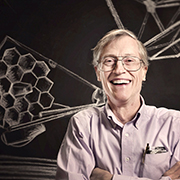John Mather

John Mather
2006 Nobel Prize in Physics
Professor John Mather believes that science is not about making grand plans. He credits his success to finding people he likes to work with and persistently tackling interesting questions with them despite setbacks.
Prof Mather’s key advice for aspiring scientists is to “talk to people”. He believes one can have a conversation with someone or have a meeting with a group of people and derive an answer to a question that no individual could have ever thought of by him or herself. “Everything good I’ve done has come from conversations with people. Science is a very social phenomenon,” he was once quoted.
In 2006, Prof Mather won the Nobel Prize in Physics alongside Professor George F. Smoot of the University of California for their collaborative work on deepening our understanding of how the universe was formed. They analysed data from the Cosmic Background Explorer (COBE) satellite, which studied the pattern of radiation from the first few instances after the universe was formed. Their work provided support for the Big Bang theory.
In his autobiography for the Nobel Prize, Prof Mather emphasised that the success of the COBE satellite project was ultimately a team effort. Drawing from his personal experiences, he also espoused this philosophy: “Life is a team sport, and it matters who’s on the team, and which team(s) one chooses to be on.”
During his graduate studies at University of California, Berkeley, Prof Mather wanted to follow in the footsteps of his hero, Richard Feynman, and become an elementary particle physicist.
However, he found himself on the brink of defeat after an unsuccessful thesis project on cosmic microwave background radiation and a few other setbacks during his postdoctoral studies at Goddard Institute for Space Studies.

